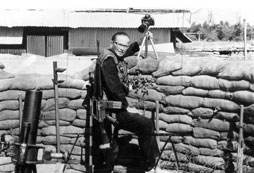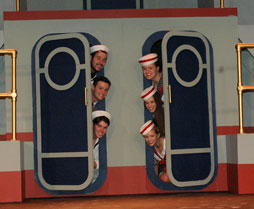By Gary Collins/reporter

Outside Chu Lai, South Vietnam, a rainbow stretched across the sky during day two of Operation Black Ferret.
Marines of B Company, 1st Battalion, 7th Marine Division, prepared to move, and tagging along was a middle-aged, near-sighted war correspondent named Dickey Chapelle.
When the boot of a marine tripped a nylon fishing wire connected to an M-26 grenade, Chapelle was lifted 21 feet up and set back down.
That moment ended the 20-year career of Chapelle, who had spent those 20 years running into war zones, and she became the first female American and war correspondent killed in combat and Vietnam.
Born Georgette Louise Meyer in 1918, Chapelle grew up in Shorewood, Wis.
After graduating high school at 16, she attended MIT, taking courses in aeronautical design, even taking a few flying courses in her own time.
While living in New York, Chapelle married her photography teacher Tony Chapelle, who encouraged her photographic career.
During World War II, Tony Chapelle was recalled into the Navy and sent to Panama. After receiving her press credentials and an assignment for Look Magazine in 1942, she followed.
This would be the beginning of her photographic misadventures. On her arrival in Panama, Naval Intelligence arrested Chapelle.
Broke, frustrated and having been fired by Look, Chapelle was further thwarted by military censors who held her assignments too long, which lead to her being fired.
After a weekend photographic assignment, Chapelle returned home only to find out her husband had transferred stateside. Chapelle had no choice but to leave as well.
In 1945 Chapelle sat off the coast of Iwo Jima aboard the hospital ship USS Samaritan.
On her first adventure into combat on the island, she naively climbed a small hill to photograph the island. While photographing, she mistook the whizzing of bullets for that of wasps.
While awaiting an escort on Okinawa, Chapelle ventured off the beach, disappearing for a week. On her return to the ship, she was again placed under arrest, stripped of her credentials and sent home.
Constantly searching for assignments and struggling for money after the war, Chapelle would learn to live and jump with paratroopers.
These activities earned her the respect of her co-workers and the military, primarily the Marines.
In December 1956 while completing an assignment in Hungary, Chapelle was arrested by communist sympathizers and was held at the Fo Street Prison in Budapest as a spy.
She spent six weeks in solitary confinement and interrogations. When released in 1957, she said “Thank God, I’m an American.”
Her experiences in Hungary influenced her anti-communist beliefs. While living in Florida one winter, she stored nitroglycerin in her freezer for Cuban exiles.


























